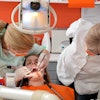
Background music reduces dental students' stress and improves their performance during preclinical tooth preparation exercises, according to a study published in the Journal of Dental Education.
Previous studies have suggested that background music can "foster education and learning," a research team from the University of Eastern Finland wrote. However, there is a dearth of data about the influence of music on the anxiety levels of dental students during practice, according to the study’s authors.
Furthermore, acquiring manual skills and competence in dental procedures is a crucial part of preclinical training. But dental skills, including basic procedures such as tooth preparation and polishing, can be stressful and difficult for undergraduates, who are in new environments and must learn how to triage patients and act.
A team led by Dr. Szabolcs Felszeghy of the University of Eastern Finland in Kuopio sought to determine whether background music positively affected students’ anxiety and performance. The study involved 36 dental students who were enrolled in a cariology course performing phantom head training exercises (J Dent Educ, May 9, 2023).
The students were exposed to periods with quiet, low-tempo background music and then periods without background music. The students were then surveyed after the experiment, and computer-aided measurements were taken to assess their performance in the exercises.
The investigators reported the following results:
- Students' overall satisfaction with the background music was high.
- Music reduced students’ stress while also increasing students' motivation to learn and practice.
- Classroom communication was efficient even with the presence of background music.
- Background music enhanced students' use of time and the quality of cavity preparation.
"This pilot study lends support to the use of background music in preclinical cariology training, as it appeared to have helpful effects on dental skills education and practice," the University of Eastern Finland said in a statement released on May 11. "This music intervention could also be extended to other stressful dental education environments."



















